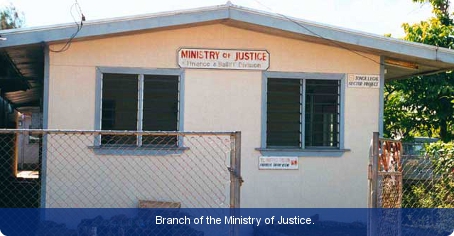Government
- Overview
- History

Under the 2010 constitution, Tonga is a constitutional monarchy and a parliamentary democracy. The monarchy is hereditary, and the monarch is head of state. Until 2010, the constitution was essentially King George Tupou I’s constitution granted in 1875, under which executive power resided with the monarch.
The unicameral legislature is the Legislative Assembly which comprises 26 elected members, nine of whom are elected by and from among the country’s 33 hereditary nobles, and 17 on the basis of universal adult suffrage. General elections must take place at least every four years.
The head of government is the prime minister, who is chosen by the Legislative Assembly and appointed by the monarch. The prime minister selects the cabinet who are then appointed by the monarch. The prime minister may nominate up to four members from outside the Assembly and on appointment they become members of the Assembly.
All land belongs to the Crown. Large estates have been allotted to nobles. By law, every male Tongan at age 16 is entitled to a small piece of agricultural land and a small town plot. In practice, there is not enough land, and the reform of the land tenure system is currently under discussion.
The Court of Appeal is presided over by the chief justice and its three other members are judges from other Commonwealth countries. It is the final court of appeal. The Supreme Court and the Land Court are also presided over by the chief justice, with one Tongan judge the other member in both cases. Litigants before the Supreme Court, in both civil and criminal cases, may opt for trial by jury. Appeals from the eight magistrates’ courts are heard by the Supreme Court.
Tonga, which comprises a number of archipelagos and is popularly referred to as ‘The Friendly Islands’, is unique among Pacific nations in that it never completely lost its indigenous governance. Tonga was already inhabited 3,000 years ago, and its Polynesian royal family goes back more than 1,000 years. In 1875 Tonga became a constitutional monarchy. A quarter of a century later the king agreed a treaty of friendship with Britain, which gave Britain control of foreign affairs. In 1970 Tonga became fully independent.
Tonga’s first political party, the People’s Party, was formed in 1994 out of the pro-democracy movement. In the 1999 elections it won five of the nine people’s seats in the assembly.
In 1999 former prime minister (1965-91) and brother of King Taufa’ahau Tupou IV, Prince Fatafehi Tu’ipelehake, died. In 2000 the king appointed his younger son, Prince ‘Ulukalala Lavaka-Ata, to replace Baron Vaea as prime minister. In 2006 he resigned and was replaced by Dr Feleti Vaka’uta Sevele as acting prime minister, the first popularly elected member of the Legislative Assembly to be appointed to the post. He was then confirmed as prime minister in March 2006.
In the country’s first democratic elections, held on 25 November 2010, the Friendly Islands Democratic Party, led by ‘Akilisi Pohiva, won 12 of the 17 popularly elected seats, but remained short of a majority in the 26-seat Legislative Assembly. The remaining seats were taken by five independent people’s representatives and nine nobles. The Assembly members initiated negotiations with a view to forming a new government. On 21 December 2010 a noble, Lord Tu’ivakano, was elected prime minister by the assembly, defeating Pohiva by 14 votes to 12.



